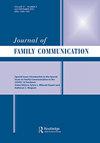“Make Your Family Proud”: Analyzing the Communication of Roles and Identity in Disney’s Encanto
IF 1.8
Q2 COMMUNICATION
引用次数: 0
Abstract
ABSTRACTIn this study, we analyzed Disney’s Encanto through the lens of identity theory using qualitative content analysis to examine how family roles and identity were communicatively constructed. Results uncovered four themes regarding the Madrigal family’s role enactment (role confirmation, role disconfirmation, conformity to family identity, and identity salience of family roles). Findings capture the mutually influential, fluctuating nature of enacting roles and identity in a family system while highlighting the importance of appreciating intergenerational dynamics, as illustrated by the Madrigals. The analysis exemplifies how media portrayals can inform societal expectations about family roles and empowers audiences to think critically about those experiences within their own families. Disclosure statementNo potential conflict of interest was reported by the authors.Notes1. For example, as Pepa had the power to control the weather, she had the duty and responsibility of properly controlling it to best serve the family and community, thus establishing her role. For family members without gifts (i.e., Augustín, Félix, and Mirabel), role fulfillment was understood as enacting traits and actions that best served the family. For example, Abuela indicates that Mirabel’s proper role is to stay out of the way and let family members with gifts do the heavy lifting when she says, “So, the best way for some of us to help is to step aside, let the rest of the family do what they do best. Okay?” (12:12)2. Certain sentences repeated in songs were not repeatedly counted in reported numbers (e.g., “We don’t talk about Bruno” was only coded once for the song). As these sentences were lyrics and were designed to fit a musical cadence, recording them individually would not have enhanced the analysis.“让你的家庭感到骄傲”:迪士尼《Encanto》中角色与身份的沟通分析
摘要本研究以认同理论为视角,运用定性内容分析的方法,分析了家庭角色与认同的交际建构过程。结果揭示了牧歌家庭角色设定的四个主题(角色确认、角色不确认、家庭认同的一致性和家庭角色的身份突出)。研究结果揭示了在家庭系统中扮演角色和身份的相互影响和波动的本质,同时强调了欣赏代际动态的重要性,如牧歌所示。该分析举例说明了媒体描述如何告知社会对家庭角色的期望,并使观众能够批判性地思考他们自己家庭中的这些经历。披露声明作者未报告潜在的利益冲突。例如,Pepa有能力控制天气,她有义务和责任适当地控制它,以最好地服务于家庭和社区,从而确立了她的角色。对于没有礼物的家庭成员(例如Augustín, fassasslix和Mirabel),角色实现被理解为制定最有利于家庭的特征和行为。例如,外婆指出,米拉贝尔的正确角色是置身身外,让有礼物的家庭成员来做繁重的工作,她说:“所以,对我们中的一些人来说,最好的帮助方式就是靠边站,让其他家庭成员做他们最擅长的事情。”好吧?”(身子)2。某些在歌曲中重复出现的句子并没有被重复计算在报告的数字中(例如,“We don’t talk about Bruno”在歌曲中只被编码了一次)。由于这些句子是歌词,并且是为了配合音乐节奏而设计的,因此单独记录它们不会增强分析。
本文章由计算机程序翻译,如有差异,请以英文原文为准。
求助全文
约1分钟内获得全文
求助全文

 求助内容:
求助内容: 应助结果提醒方式:
应助结果提醒方式:


